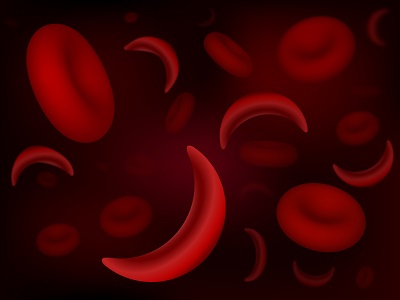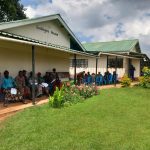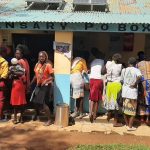CSP ICI Sickle Cell Disease Preceptorship
Multidisciplinary management, standards of care, optimal diagnostics, therapies and future perspectives in the care of Sickle Cell patients in sub-Saharan Africa.
Eldoret, Kenya
Training Duration: 6 weeks
Course Director: Prof. Fredrick Chite Asirwa MD
Consultant Physician. Medical Oncologist & Hematologist Executive
Director/CEO: International Cancer Institute (ICI)
P.O. Box 8088, Code 30100 Eldoret, Kenya
Email: director@intercancer.com Website: www.intercancer.com
Course Coordination: Dr. Kevin Makori
Head, Office of Education and Training
International Cancer Institute (ICI)
P.O. Box 8088, Code 30100 Eldoret, Kenya
Email: kevin.makori@intercancer.com Website: www.intercancer.com
This educational activity is provided independently by International Cancer Institute (ICI) through the Blueprint Program

ICI Education & Training Mission Statement
The ICI Preceptorship Program Mission is to measurably contribute to cancer patients’ safety and health outcomes and to support practice improvement by providing CME/CPD activities that enhance the ability of physicians and other healthcare team members to deliver quality and optimal healthcare services.
Purpose
The purpose of the ICI Preceptorship Program is to develop educational activities that clearly link the needs of the learner/participants with the planning process, format, and delivery of each activity, resulting in high-quality continuing medical education/continued Professional Development opportunities that will increase the knowledge, competence, and performance of health-care providers.
Content Areas
The ICI Preceptorship Program activities include practical, evidence-based, best clinical practice information for a broad variety of common oncology and hematology conditions, innovations in primary and specialty patient care in NCDs, new procedural training, and specialty fora. The appropriate content for each course is determined based on the results of a practice gap analysis relative to the target audience’s scope of practice, as well as the identified expected outcomes. Content is free of commercial bias.
General Target Audience: ICI Preceptorship/CME/CPD activities focus on the needs of generalist and specialist physicians and other multidisciplinary healthcare team members at ICI-affiliated cancer centers nationally and in sub-Saharan Africa as appropriate.
Type of Activities Provided by ICI
In order to accomplish our educational goals, ICI CME uses a range of activity formats based on the content and desired results of the activity. Current offerings include live and video conferenced activities, live regularly scheduled series, internet CME activities, enduring materials, and hands-on skills workshops. ICI also jointly sponsors activities with regional specialty societies, non-profit educational organizations, and government agencies when mutually desired goals and outcomes are best achieved by such relationships.
Expected Results of the Preceptorship Program
ICI Preceptorship/CME/CPD is committed to assessing the impact and effectiveness of its CME/CPD Program. ICI courses are designed to: increase knowledge of new treatments, diagnostic tools, and procedures; improve compliance with the specific evidence-based standard of care protocols; improve competence, performance, and/or patient outcomes; and promote efficient use of resources. We employ assessment methods to evaluate the extent to which our activities result in changes in knowledge, competence, and performance. CME activities in conjunction with quality improvement projects have measurable outcomes to report. An emphasis during the planning process is placed on intended learning and desired change in knowledge, competence, and performance. The ICI Education and Training Office works in collaboration with other departments/offices of the International Cancer Institute and its partners who are involved and interested in quality improvement processes and patient safety.
Target Audience
The primary target audience for this course comprises the multidisciplinary clinical Sickle Cell care team members including, but not limited to physicians; fellows; residents; researchers; SCD nurse practitioners and SCD nurses; SCD pharmacists; SCD PharmTechs; SCD clinical officers; physician assistants; Laboratory scientists and technicians and other allied health care professionals.
LEARNING OBJECTIVES
At the end of this educational activity, participants should be able to:
- Describe the epidemiology, molecular basis, presentation and natural history of SCD and the variant sickle cell syndromes
- Describe the techniques for Screening and the diagnosis of SCD; Correctly interpret electrophoresis and HPLC traces
- Understand the pathophysiology and clinical manifestations of sickle cell disease: acute pain crises and progressive organ damage.
- Describe the management of specific major acute complications, including the acute chest syndrome, painful crisis, stroke etc
- Describe the long-term complications of SCD (including orthopaedic, ophthalmic, renal, pulmonary, endocrine and fertility issues) and their management, in particular, the need for comprehensive multidisciplinary care
- Understand the use of disease-modifying agents in the management of SCD
- Understand gene therapy, stem cell transplant and novel therapies in SCD treatment
- Explain appropriate use of transfusion in SCD
- Describe the complications, assessment and treatment of transfusional iron overload
- Demonstrate a working knowledge and practical competency for acute and chronic pain management in patients with sickle cell disease.
- Design a Health maintenance program for Pediatrics, Adolescents and Young Adults with SCD
Disclosure of Conflicts of Interest
International Cancer Institute (ICI) requires instructors, planners, managers, and other individuals and their spouse/life partner who are in a position to control the content of this activity to disclose any real or apparent conflict of interest they may have as related to the content of this activity. All identified conflicts of interest are thoroughly vetted by ICI for fair balance, scientific objectivity of studies mentioned in the materials or used as the basis for content, and appropriateness of patient care recommendations.
The faculty must report any financial relationships or contractual relationships they or their spouse/life partner have with commercial interests related to the content of this continuing education activity.
Disclaimer
Participants have an implied responsibility to use the newly acquired information to enhance patient outcomes and their own professional development. The information presented in this activity is not meant to serve as a guideline for patient management. Any procedures, medications, or other courses of diagnosis or treatment discussed in this activity should not be used by clinicians without evaluation of patient conditions and possible contraindications on dangers in use, review of any applicable manufacturer’s product information, and comparison with recommendations of other authorities.
Disclosure of Unlabeled Use
This educational activity may contain a discussion of published and/or investigational uses of agents that are not indicated by the FDA. The planners of this activity do not recommend the use of any agent outside of the labeled indications.
The opinions expressed in the educational activity are those of the faculty and do not necessarily represent the views of the planners. Please refer to the official prescribing information for each product for discussion of approved indications, contraindications, and warnings.
Method of Participation and Request for Credit
To receive credit for this activity, participants must review the activity information including learning objectives and faculty/planner disclosures, and actively participate in the educational activity. Upon successfully completing the post-test with a score of 75% or better and the post-activity evaluation, your certificate will be made available immediately.
LECTURES/COURSEWORK
Orientation to the course
- Epidemiology, Molecular basis, Presentation, and natural history of SCD
- Screening and the diagnosis of SCD
- Pathophysiology and Clinical Manifestations of SCD
- Management of acute complications of SCD
- Long-term complications of SCD and Management I
- Long-term complications of SCD and Management II
- Disease-modifying agents in the management of SCD
- Gene therapy, stem cell transplant, and novel therapies in SCD treatment
- Transfusion in SCD
- Iron overload management in SCD
- Acute and Chronic pain management in patients with sickle cell disease.
- Health maintenance in SCD
- Psychosocial Issues in SCD Management
- Case discussions in SCD management
- Improving SCD transitions of Care: From Pediatrics to Young Adult
Participants should be willing to spend at least 4 hours per week on this online course over a period of 6 weeks. (Duration 24 hours). This program will start when the class is fully subscribed. The course cost is $200.00 for the entire course. There are few sponsorships available on a first-come basis for those who apply. Priority will be given to those working in cancer centers that have formal affiliations/Partnerships with the International Cancer Institute. Apply for sponsorship during the registration of the course
All those interested in registering for this course, please register your information on www.elearning.intercancer.com if you have any questions or queries please send an email to education@intercancer.com or director@intercancer.com
For more information visit our website www.intercancer.com
International Cancer Institute (ICI) ©2022
Your Partner in Cancer Control in SSA
CSP102 ICI SICKLE CELL DISEASE
KSh2,000.00 – KSh20,000.00
Description
Subscribing to the course
You can purchase the entire course at Ksh. 20,000 ($200) or the individual units at Ksh. 2,000 ($20).
- Epidemiology, Molecular basis, Presentation, and natural history of SCD
- Screening and the diagnosis of SCD
- Pathophysiology and Clinical Manifestations of SCD
- Management of acute complications of SCD
- Long-term complications of SCD and Management I
- Long-term complications of SCD and Management II
- Disease-modifying agents in the management of SCD
- Gene therapy, stem cell transplant, and novel therapies in SCD treatment
- Transfusion in SCD
- Iron overload management in SCD
- Acute and Chronic pain management in patients with sickle cell disease.
- Health maintenance in SCD
- Psychosocial Issues in SCD Management
- Case discussions in SCD management
- Improving SCD transitions of Care: From Pediatrics to Young Adult
Additional information
| CSP | Epidemiology, Molecular basis, Presentation and natural history of SCD, Screening and the diagnosis of SCD, Pathophysiology and Clinical Manifestations of SCD, Management of acute complications of SCD, Long-term complications of SCD and Management I, Long-term complications of SCD and Management II, Disease-modifying agents in the management of SCD, Gene therapy, stem cell transplant and novel therapies in SCD treatment, Transfusion in SCD, Iron overload management in SCD, Acute and Chronic pain management in patients with sickle cell disease., Health maintenance in SCD, Psychosocial Issues in SCD Management, Case discussions in SCD management, Improving SCD transitions of Care: From Pediatrics to Young Adult, Full Course |
|---|






